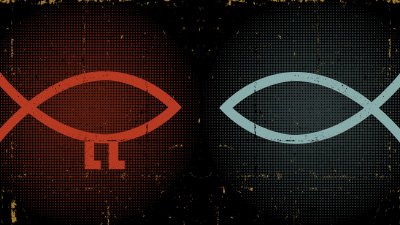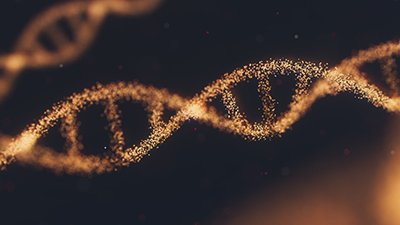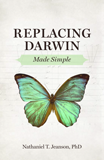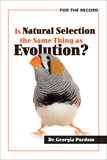Evolution Day Struggles For Survival
On November 24, 1859, the first edition of Darwin’s book On the Origin of Species was published. Then 115 years later on November 24, 1974, the Australopithecus afarensis fossil known as Lucy was discovered by Donald Johanson and Tom Gray in the Hadar Formation in Ethiopia. Lucy was almost immediately dubbed our oldest direct human ancestor.1
What Is Evolution Day?
To commemorate these two events, there has been a modern push to have an Evolution Day celebration. The term Evolution Day seems to have been coined fairly recently, perhaps in the 1990s.2 But the precedent for commemorating On the Origin of Species goes back to at least 1909, when a 50th anniversary celebration was held at Cambridge University. More than 400 scientists and dignitaries from 167 countries met in a widely reported event of public interest to honor Darwin's contributions.3 Additional celebrations were held at the New York Academy of Sciences, the American Museum of Natural History, and the Royal Society of New Zealand, although none of these were held in November. On the 100th anniversary of the publication of On the Origin of Species, a Darwin Centennial Celebration was held at the University of Chicago from November 24–28, 1959.
Although earlier commemorations seem to have focused exclusively on Darwin, the discovery of Lucy in 1974 has been folded into this “celebration” of evolutionary biology.4 In fact this emphasis on evolutionary biology is the stated purpose of Evolution Day: “by highlighting Darwin's contributions to science, the day's events are used to educate about evolutionary biology.”5
Nothing New
Darwin was not the first to suggest a theory of evolution.
Darwin was not the first to suggest a theory of evolution (the idea goes back at least as far as the Greek philosopher Anaximander [ca. 611–546 BC]),6 nor was Darwin the first to postulate a means by which evolution might occur. The Greek philosopher Empedocles (ca. 490–430 BC) argued that chance alone “was responsible for the entire process” of the evolution of simple matter into modern humankind. Empedocles concluded that spontaneous generation fully explained the origin of life, and he also taught that all living organism types gradually evolved by the process of trial-and-error recombinations of animal parts.7 Darwin also borrowed from (but expanded or altered) or was influenced by other close predecessors or contemporaries, such as Alfred Russel Wallace, Jean-Baptiste Lamarck, and Darwin’s grandfather Erasmus Darwin.
But On the Origin of Species was widely read and followed closely on the heels of Lyell’s Principles of Geology (published in 3 volumes from 1830–33), which had been largely accepted and had introduced the concept that the history of the earth covered millions of years. With long spans of time to work with, Darwin’s idea of descent with modification gradually gained more and more acceptance.
Darwin Observed Speciation, not Evolution
As we have discussed in several articles,8 what Darwin really observed was natural selection (an observation accepted by creationists), which he hypothesized was the driving force of (goo-to-you) evolution. But natural selection and mutation are unable to evolve the diversity of life from a common ancestor. Natural selection may be a component of speciation (and recent research shows that it is a very small component); however, this does not lead to new kinds of organisms, just variety within a biblical kind.
In addition, we’ve discussed Lucy numerous times, and even have an exhibit about Lucy in our Creation Museum. Lucy is just a type of extinct ape that was not bipedal, but shows clear evidence of being a knuckle-walker. The primary evidence for Lucy being bipedal is actually based on human footprints found in volcanic ash over 1,000 miles from where Lucy was buried.
The Importance of Evolution to Biology?
Getting back to the main reason for Evolution Day, however, let’s examine again whether we need to commemorate and educate people on evolutionary biology. First of all, it has been shown that many college biology textbooks only give lip service to Darwinism.9 Additionally, many science professors acknowledge that Darwinian evolution plays almost no role in research.
Adding to this, Professor Henry F. Schaefer III, the Graham-Purdue Professor of Chemistry and Director of the Center for Computational Chemistry at the University of Georgia, quotes Michael Behe:
“Darwinian assumptions are not needed for the day-to-day work of science. If you look at the biochemical literature for scientific papers that try to explain how biochemical systems developed step-by-step in Darwinian fashion, there aren’t any. It’s startling. Most biologists completely ignore evolution in their work, and the ones that think about it simply look for relationships and don’t bother with Darwinism.” My University of Georgia colleague in biochemistry, Professor Russell Carlson, has expressed the same sentiment to me privately.10
Conrad E. Johanson, professor emeritus of neurosurgery at the Warren Alpert Medical School at Brown University in Rhode Island, noted that research scientists
rarely deal directly with macroevolutionary theory, be it biological or physical. For example, in my 25 years of neuroscience teaching and research I have only VERY rarely had to deal with natural selection, origins, macroevolution, etc. My professional work in science stems from rigorous training in biology, chemistry, physics, and math, not from world views about evolution. I suspect that such is the case for most scientists in academia, industry, and elsewhere.11
Evolution Day Not Fit to Survive
While it is true that we all suffer from the effects of the curse, due to Adam’s fall, this does nothing to detract from the amazing design inherent in all biological systems.
So why should a day be set aside to commemorate evolutionary biology, especially when its importance to research, medical practice, and diagnosis is nonexistent? Apparently the only fields that it affects are evolutionary biology, paleontology, and anthropology. In fact, it has been shown that evolutionary assumptions foisted onto biology have actually hampered research, caused erroneous diagnoses, and been the main reason for decades of useless (and even harmful) surgeries.12 However, when one views both animal anatomy and the human body through the viewpoint of divine design, we recognize that an all-wise Creator would not burden us with “useless” parts. Animal and human bodies are well designed to live and thrive in the various environments God placed them in. While it is true that we all suffer from the effects of the curse, due to Adam’s fall, this does nothing to detract from the amazing design inherent in all biological systems.
Ironically, setting aside an Evolution Day seems to not be gaining much traction even in secular circles. Anyone doing a cursory search for “Evolution Day” will see that the number is far outstripped by “Darwin Day,” which is celebrated on February 12 each year. In fact, it appears that in some cases even hotbeds for evolutionary thought have merged the holidays and celebrate Darwin and Evolution Day together on February 12.13 Ironically, it appears that in its struggle for survival, Evolution Day is not the fittest.
Celebrate Creation Instead!
But why even bother to celebrate a holiday based on man’s faulty opinion regarding the origins of living things? Scripture tells us exactly how (and a close approximation of when) the entire universe and all of earth’s animal and human life forms came into existence. They were created by God over six 24-hour days, on Days 5 and 6 of Creation Week, just a little over 6,000 years ago. Rather than elevating man’s opinion above Scripture, why not celebrate a Creation Day holiday instead? You could choose to do this on November 24, February 12, or perhaps another day, like our friends at the Creation and Earth History Museum who celebrated on November 5. But however and whenever you do it, it is right and proper to give God the glory for His wondrous creative acts.
You are worthy, O Lord, to receive glory and honor and power; for You created all things, And by Your will they exist and were created. (Revelation 4:11)
Footnotes
- Melissa Hogenboom, “The Lucy Fossil Rewrote the Story of Humanity,” BBC, November 27, 2014, http://www.bbc.com/earth/story/20141127-lucy-fossil-revealed-our-origins.
- Evolution Day, Wikipedia, https://en.wikipedia.org/wiki/Evolution_Day.
- “1909: The First Darwin Centenary,” Darwin Online, http://darwin-online.org.uk/1909.html.
- Jeffrey Kluger, “On Evolution Day, Remember That Darwin Knew He’d Meet Resistance,” Time, November 24, 2014, http://time.com/3602107/darwin-evolution-day/.
- “National Days, Holidays, Observances,” http://calendarholidays.xyz/national/november/evolution-day/.
- “Evolution and Paleontology in the Ancient World,” University of California, Berkeley, http://www.ucmp.berkeley.edu/history/ancient.html.
- Jerry Bergman, “Evolutionary Naturalism: An Ancient Idea,” Answers in Genesis, August 1, 2001, https://answersingenesis.org/theory-of-evolution/evolutionary-naturalism-an-ancient-idea/.
- See Monty White, “Hasn’t Evolution Been Proven True?,” chapter 23 in The New Answers Book 1 (Green Forest, AR: Master Books, 2006), https://answersingenesis.org/theory-of-evolution/evidence/hasnt-evolution-been-proven-true/; Lane Lester, “Genetics: No Friend of Evolution,” Answers in Genesis, March 1, 1998, https://answersingenesis.org/genetics/genetics-no-friend-of-evolution/; “Origin of (a) Species,” Answers in Genesis, November 21, 2009, https://answersingenesis.org/natural-selection/speciation/origin-of-a-species/.
- See Jerry Bergman, “An Evaluation of the Myth That ‘Nothing in Biology Makes Sense Except in the Light of Evolution,’” Answers Research Journal 5 (2012): https://answersingenesis.org/theory-of-evolution/nothing-in-biology-makes-sense-except-in-the-light-of-evolution-myth-evalutation/.
- Henry F. Schaefer, Science and Christianity: Conflict or Coherence? (Athens, Georgia: The University of Georgia, 2004), 102.
- Bergman, “An Evaluation of the Myth That ‘Nothing in Biology Makes Sense Except in the Light of Evolution.’”
- See James J. S. Johnson, “Tonsils, Forensic Science, and the Recent Fabrication Rule,” Acts & Facts 41, no. 6 (2012): 8–9, http://www.icr.org/article/tonsils-forensic-science-recent-fabrication.
- “Darwin (Evolution) Day—February 12, 2016,” University of California, Berkeley, http://essig.berkeley.edu/darwin-evolution-day/.
Recommended Resources

Answers in Genesis is an apologetics ministry, dedicated to helping Christians defend their faith and proclaim the good news of Jesus Christ.
- Customer Service 800.778.3390
- Available Monday–Friday | 9 AM–5 PM ET
- © 2026 Answers in Genesis







